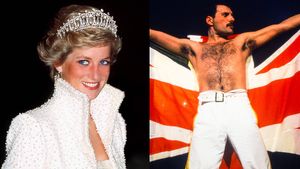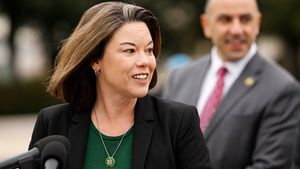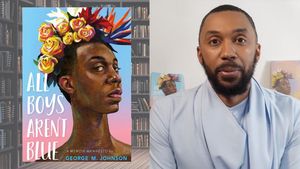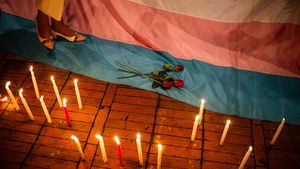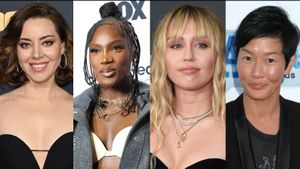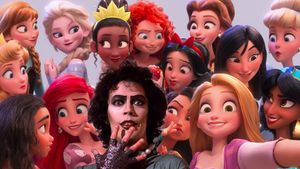Miss Tina Knowles, the mother of the global superstar Beyoncé, is spilling all the tea in her new memoir Matriarch.
The iconic 71-year-old designer and writer cracks open her life, candidly sharing what it was like to grow up in Galveston, Texas, during the civil rights movements of the 50s, 60s, and 70s, and speaks at length about her gay relative and best friend, Johnny.
Fans might remember Uncle Johnny from Beyoncé's 2022 Renaissance era. The singer dedicated the disco trap albumto her uncle, who made outfits for Beyoncé in her early career. On "Heated," Beyoncé sings, "Uncle Johnny made my dress/that cheap spandex/she looks a mess." She concluded each live show with a photo of Uncle Johnny holding her as a child. Beyoncé also spoke about Uncle Johnny while accepting the GLAAD Vanguard Award for allyship in 2019.
Sign up for the Out Newsletter to keep up with what's new in LGBTQ+ culture and entertainment — delivered three times a week straight (well…) to your inbox!
"He was brave and unapologetic during a time when this country wasn't as accepting. Witnessing his battle with HIV was one of the most painful experiences I've ever lived," she said. "I'm hopeful that his struggle served to open pathways for other young people to live more freely. LGBTQIA+ rights are human rights."
Matriarch reveals just how close Knowles was with Johnny. "It was my honor to be his protector," she writes. "To give him the flower that he tucked behind his ear."
"We needed each other," Knowles tells Out in our exclusive interview. "I was a really hyperactive kid. I didn't know what ADHD was, but I definitely was that. Me and Johnny were the rebellious two who never wanted to go with the crowd. We went against everything. He protected me always, and I protected him, it was a mutual thing. We felt like it was us against the world. We would get in our own little world where we'd be designing clothes and making stuff or doing drag shows and nobody understood us. We might have our hair green one day and orange. We wore these crazy, wild clothes. You can imagine in a little small town like that that we were not the norm. We were both outcasts and we just leaned into each other. He was the closest person in my life who understood me. I didn't feel like anybody else understood me."
In the memoir, Knowles reveals that she introduced Johnny to the Galveston gay scene at 17 years old in 1971. Once she knew she was going to leave town after graduating high school, she wanted to set up Johnny with a community. After discreetly asking queer-coded kids at school where they went "to have fun," she found out about the Kon Tiki gay bar, and she and Johnny went for the first time together.
"It was a very nondescript place," Knowles recalls. "No signage or anything that you go in and then you open this door and it doesn't look very nice on the outside, but when you go inside, it was the first time I saw a dance floor with lights on it. It was beautiful, it was a disco. I talk about it in the book that I'm just out there dancing and say, 'Oh this is a pretty floor,' and then they revealed to me what the lights are and I'm like, 'Oh Lord.'"
She didn't realize the floor was lined with light-up penises. Johnny "would tell everybody that story. He would be like, 'And Mary was in there just dancing away, and she didn't know what was on the floor.'"
Those moments changed her, she says. "I just remember being in that place and saying, 'Oh my God.' Back then, they were trying to just keep their business to themselves cause it was not accepted. After that, he was like, 'Mary, you don't need to come no more because now you're gonna become a spectator.' I only went back one time and that was for a show. But those are my memories of it."
Knowles then casually reveals that her prestigious sewing career began by helping Johnny make dresses for local drag queens.
"It was just a place of, God, I can't tell you the feeling. I get emotional thinking about," she tells Out. "Just that place of acceptance, that he is in a place where nobody is thinking he's different or strange or whatever, like he just feels at home. He was so happy. I cannot tell you how happy he was and how that was his safe space and so I was beyond happy. I felt like I had done my job."
The book is certainly a celebration of his life, but Knowles also opens up about his death. Johnny got sick in 1997 and was diagnosed with AIDS-related dementia in the summer of 1998.
It was a hard time for everyone, says Knowles. There "was so much ignorance and so much miseducation. So many missed opportunities for us, too. I think the worst part, and I talk about it in the book, is when Johnny went into hospice and I would go over there and stay with him, and there were so many men in there who had never had a visitor and their family had just disowned them and they didn't have anyone. One of the young men was in his final days and he thought that I was his mother. I think something about my voice sounded like his mom. That was the worst. It was really one of the worst times of my life because I never felt so helpless. We tried to do what we could do and there were medications that were available, but they weren't available to a Black man at the time or even a probably a poor white guy. It was only available to the select few. It's nobody's fault, it just wasn't readily available."
This all took place as Knowles' daughter was rocketing to stardom. Destiny's Child's first hit was "No No No" in the fall of 1997. Beyoncé was 16 years old. Johnny died on July 29, 1998, surrounded by his family, a few months after the release of Destiny's Child's debut album.
"I get sad a lot of times because not much later after Johnny died, this medicine became available for everybody and people lived," says Knowles. "His friends, just every day, it was somebody. He was calling me and saying, 'Oh they're gone.' It was a hopeless, hopeless time, but you know, thank God that not long after, they have these medicines and people can live a good life and take care of themselves. They even have preventative things now. I can't help it, I try not to go back in the past, but a lot of times I am still very saddened that this didn't happen a little bit earlier."
Beyoncé released her album Renaissance on the 24th anniversary of Johnny's death, July 29, 2022.
Almost 30 years after his death, it feels like Johnny is only just beginning to get his flowers. Celebrating Uncle Johnny's impact on one of the biggest pop stars in the world has made him a stand-in for the forgotten Black queer people at the center of the arts, of music, of life. So many of our stories have been erased or washed away. Uncle Johnny matters, and by proxy, so do we.
"I believe that he is in heaven and he is looking down and saying, 'All right, Mary, I told you!'" Knowles says. "Johnny used to always say to me, 'I deserve to be famous,' and he did. How about that? He was so talented and if he was born in another time and space, he would have been the biggest designer and just lived his best life. Not that he didn't, because he lived until he couldn't live, you know. Even in those final days he was still laughing and talking stuff and cracking jokes and being Johnny. But I know that he is smiling and so happy about this. He wouldn't have been humble about it at all. He would have ate this all right up. That gives me comfort too. He's up there with my mom and his mom and, and they are looking down and protecting us every day."
Knowles is especially excited for LGBTQ+ fans to learn more about Johnny's life and loves.
"He did get a relationship," she says. "It was the love of his life and they were married in every sense of the word other than on paper. I just thank God that he got to experience that and experience real love, that he got to experience that in his life. Unfortunately, Peanut passed away from breast cancer, ironically. A lot of his story is sad, but a lot of it is just about us clowning and having the best time."
Knowles also reveals, "There was a lot more in the book. The book was 1,000 pages. And the editor came back and said, Ms. Tina, I read every story and I wish this book could be 1,000 pages, but nobody's gonna read 1,000 pages and you can't do it, so we had to cut it down to 5, and I think we succeeded with like 525, but I have a whole other book. It's such great stories about Johnny. If I told all the stories about Johnny, that'd be a whole book by itself."
Perhaps there's still hope! "I'm thinking that I might have to do that," says Knowles. "I might just have a Johnny book. You don't understand how much it means to me, every time I get on one of these interviews and somebody asks me about him and they really want to know about him and how many young men have told me that they didn't experience that kind of love. To us, it was an acceptance. Now that I'm older and I'm looking at it, those were not the norm. We were kind of abnormal when it came to family. But when they tell me, you know, I didn't have that but it still makes me feel good to know that somebody had that, you know, that they had that unconditional love and protection."
In an era where the Trump administration is erasing LGBTQ+ people and history, Knowles says it's more important than ever for all of us to share our stories.
"It's crazy what's going on right now. We're just erasing our history," she says. "It's important that you write your history, that you write your own book, not necessarily to be published, but just for your own legacy and to pass it on. And it helps you heal. It helps you work through a lot of stuff. Even in writing this book, I realized that I had a lot of trauma and I didn't even think of it as trauma because I didn't know. I just thought this was my life and it happened and I got over it, but I didn't get over it, and it's the reason why I kept trying to rewrite my own life story and make it right. I can make it right, you know? I can fix it. I finally dealt with how painful it was for me."
And finally, we just had to ask about Beyoncé's "Freakum Dress" music video.
For many fans, it was their first time seeing queer Black men in a music video. Legend says Miss Tina was backstage frantically making different colored dresses for Bey to wear, but she's grateful for its impact now.
"You know, I never even thought about that's the first time that people experienced that," she shares. "I'm actually with her, you know, get ready for Cowboy Carter, and oh Lord, it's just constant change. It's no big deal because, you know, she grew up with me making those dresses right on the spot and creating stuff, so she really thinks it just kind of rains down from the sky. It's a whole different level now. I can't pull out my little sewing machine and make something in five minutes, but that was so much fun for that video. We had a ball on that video."
Matriarch by Tina Knowles is out now. Beyoncé's Cowboy Carter tour kicks off in Los Angeles on April 28.













